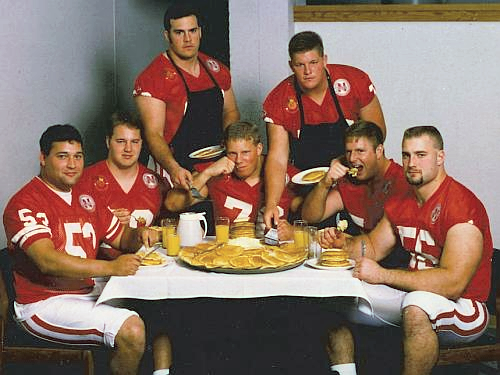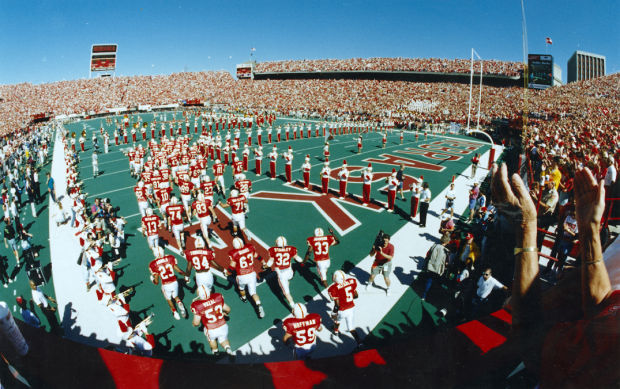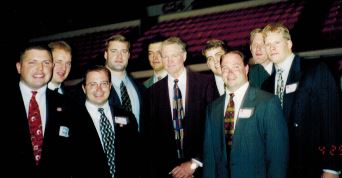Anatomy of an Era: Rob Zatechka, Part 4

Excerpted from Chapter 30, No Place Like Nebraska: Anatomy of an Era, Vol. 1 by Paul Koch
Rob Zatechka, Part 4
Q: Rob, do you remember the first game you played in?
RZ: It was the opening game of the ’91 season. I’d have to go look it up. One of those mildly nondescript -and I hate saying that- nonconference opponents. We always had some good teams: we had Arizona State twice, Washington twice, Texas Tech, West Virginia, UCLA, we played Utah. I want to say it was Utah, or Utah State was the opening game. We played Colorado State a couple times, and when Sonny Lubick was there they were solid, actually. It was a pretty good team.
I’ve got to be honest with you, after butting heads with Kenny Walker for a year and then after Kenny left, guys like Parrella, David Noonan, Ramaekers, Jamie Liewer, practice didn’t get a heck of a lot easier. Some of the best guys I played against were the guys I was hitting heads with in practice.

Tunnel Walk to daylight and the Sea of Red ’94 (Unknown/Uncredited)
Q: Any good practice memories?
RZ: (laughs) There’s always little things, stuff that makes you laugh when you remember. For example: the scout team defense always wore gray jerseys and on offense we always wore the red mesh over our gray t-shirts. And I remember one day in practice, I don’t know why, I just decided I wasn’t wearing my red mesh over my gray t-shirt.
And it was Thursday practice and it was light contact, and it took Osborne until like the middle of watching practice film… and he looks at me on film at the team meeting after practice and I’m wearing a gray shirt. And then he takes his little laser pointer and circles me, and it looks like I’m this big defensive player who’s out of position, but at the same time there’s no offensive player blocking him. And Osborne starts circling him with the laser pointer and he says, ”Hey! Hey! Hey! Who’s got this guy!? Why isn’t anybody blocking him!?” (laughs) And I remember going -in the middle of the team meeting- going, ‘Oh, that’s me, Coach!’ And there was like that big pause from Osborne, and he reversed the tape and runs it backward a couple of times, and he sees me going up and blocking the linebackers. And he looks at me and he turns and goes, “Why aren’t you wearing a red jersey?” And I don’t know what I was thinking, but without pause, without batting an eye, I tell Osborne, ‘Oh, you can’t see me Coach. I’m in ‘stealth mode.’’ (laughs) I remember, it was one of those comments where Coach Osborne was speechless, didn’t know what to say. And a little bit more, he didn’t want any further explanation. (laughs) He was basically, “I don’t even want to broach the subject further than it already is.” He was like, “Well, okay Rob.” Maybe once a month for the next few years after that somebody on the offensive line would just not wear the red jersey and he‘d be, “What are you doing?” And it would be, “I’m in ‘stealth mode’ today, Coach.” (laughs) There’d always be that big, long pause. (laughs) It was always performed deadpan. And it was always goofy stuff like that.
Remember Larry Townsend? Big defensive tackle out of California? I always remember him wearing his parka under his pads to practice. The California guy was so averse to cold, he actually wore his full-on full length NorthFace parka under his pads. Stuff like that, those are the kinds of the little tidbits that you always remember from back then. It’s always crap like that makes you laugh from those days.
Q: Any off-field shenanigans for you?
RZ: I was a pretty clean-living guy for the most part. But the off-field stuff, I just remember the fact that everybody always kind of hung around with each other from my freshman year on, and it was one of those things where you’d always end up that a bunch of the brothers on the team would have a house party and you’re hanging out with them or they’d hang out with you. Everybody got along well and hung out with everybody else around the team.
Like my sophomore year on we started having rules, like “No parties after Wednesday night.” Which always killed me, because then you had all the guys going out drinking on Wednesday night. (laughs) Half the time after the game you were too tired to really raise much of a ruckus and it seemed everybody had a steady girlfriend, so you usually went with her to eat after the game, anyway. Still, everybody was such a nice, close-knit group of guys. It wasn’t so much the specific instances, it was just the fact that all the guys really got along.
Q: The opposite of that one early meeting in the weightroom you were talking about?
RZ: Yeah, half the team on one side and half on the other side of the room. But it seemed after that you never ever saw that type of thing anymore. It would have been interesting in the Callahan years, I imagine there was like ten different groups split apart. And like I said, in general the O-line hangs out together, the D-line hangs out together, the defensive backs hang out together, but as a whole we really got along well together.
Q: Any special relationships for you?
RZ: The big thing, for the O-line, obviously, we still keep in touch. We keep up on who’s doing what and where, but at the same time you go to an alumni event, the spring game, a game in the fall, and the guy who’s a third string safety as a senior when you were sophomore, you run into that guy at the game in the fall and you just strike up a conversation and it’s like it was 15-20 years ago hanging out and B.S.-ing with them. That relationship’s always there. That’s the thing. It’s a really good, common bond to have. It’s one of those things where everybody gets together and we just really keep in good touch with each other. I still run into guys I literally haven’t seen in 15 years, and you just strike up that conversation and it’s the instantaneous relationship with that person again.
Amongst the players (granted, Steve Pederson kind of started the tradition), a lot of guys make an effort to show up in the fall to the games, the tailgate events. And I’ve got to tell you, there’s a lot of guys I’ve reconnected with over the last 3-4 years. There always seems to be a guy or two where you wonder what the heck happened to them, and I’ve run into them, so that’s a great thing. From the alumni standpoint, they’ve done a really great job, getting the guys to really show up again and show their face.
Ben Kingston, a former fullback from the Solich era, his dad is a surgeon. I do anesthesia with him every now and then. Ben started a website for former players to log onto as a networking site, so that is good, too. And I trade e-mails with Boyd every so often, too, so that’s nice.

Rob Zatechka (4th from left) Spring Football Banquet (Unknown/Uncredited)
Q: Rob, one of my most fond memories of those days was our old dumbbell incline press contests, just you and me. Remember those? At least it was a contest for me…
RZ: Oh my God, Paul, I have to tell you: at the tail end of the Callahan era I went to a game, and one of the sheriff’s deputies who does security for the games took me back into the weightroom after the game, he took me back to that area and I went and found those dumbbells. They’re still there! They’re pretty dusty. Doesn’t look like they’ve been used extensively. Do you remember those 150’s? The 150 pounders? Then Boyd bought that new set and got them up to 175 lbs. God, yeah, I remember. We used to pound them out. And I’d get to those 175’s. And then I went to the Giants. The (New York) Giants had 180’s! I was like the only guy on the team who did ‘em.
Q: I remember always trying, thinking, ‘Okay, I weigh about half as much as Rob, but I’m gonna push this guy.’ Remember that one day I had the 150’s and did two or three reps, and then you picked ‘em up and repped out about 9 or 10 of them? I went, ‘Damn!’ (laughs)
RZ: (laughs) That would crush me now. The gym I work out at now, they have 110’s. For my first set I rep them out at like 20 reps. It’s still fun.
Q: And hey, I have to tell you, there’s a high school kid from my church who I had over to my garage gym last night and we did the old Metabolic Power Circuit…
RZ: Oh, you wanna know what kills me? Now that’s the kind of lifting I do, the circuit, the high reps…and hey, you wanna know a cool workout I’ve been doing lately? I got this workout from a bunch of SWAT Team guys in Omaha. They’re a bunch of mixed martial arts guys. I work out with them, too. They’d have tears rolling down their face. It’s the worst lactic acid burn I’ve ever felt in my entire life. It’s like hitting yourself in the head with a baseball bat and then you’re done, then the next day you’re a little bit sore, and then it’s two days later -like Bryan Bailey’s DOMS, the delayed onset muscle soreness. Then it hits you. I thought, ‘Holy crap, what did I do to my chest?’ (laughs)

Both volumes available on Amazon.com
Q: And what’s your little brother doing nowadays?
RZ: He’s here in Omaha, a pharmaceutical sales rep with Merckk. He’s a drug pusher. Give him a holler. And if you ever need anything just give me call, I’ll likely either be in the operating room or changing a diaper or something, (laughs) but I’ll get back to you somehow.
End conversation.
Rob, as was evidenced in this interview, has always been about two steps ahead of the pack and continues to be a blast to converse with. You’ve no idea how much fun it was in those days for me (weighing about 165-170 lbs.) to take on a 315 lb. Rob in a dumbbell incline press contest. He would, of course, always win, but I’d like to think that my competitive spunk would somehow rub off on him. The other strength staff seemed to have the same modus operandi, and I think it paid off in some small sense for these guys that a full, relentless effort was the key, results coming what may. I remember Rob one day entering the Strength Complex where we sat down on the weight benches and he told me, rather sullenly, how offended he’d been earlier that day, “You wouldn’t believe what some guy called me… the guy takes a look at me,” goes Rob, “and says, “Holy crap, dude, you’re like a Coke machine with arms!”“ I nearly fell off the bench laughing! Not because the metaphor wasn’t somewhat accurate, but that this big guy was so offended by it and allowed it to ruin his day, exposing the fall in his countenance to me. It was that kind of relationship all around the place with these guys, where facades were few and far between, where many of the people were quite open and exposed to each other with a pervasive sharing, trusting and oneness. These kids could be themselves, and this kind of environment kept the tendency to project false images of strength and invincibility at a minimum. As a result, they were freed up to boldly pursue failure: on the practice field, in the weightroom, in summer and winter conditioning. This limitless pursuit of failure allowed them to mature and, I believe, paradoxically produced their success. It allowed them to go ‘stealth mode’ quite often, to use Rob’s words.
Rob also brought up the growing experience and maturity level of those teams, as well as a college kid’s inability to maintain focus and effort throughout an entire season. Despite the human body’s inability to maintain more than 8 weeks of peak performance capabilities before it loses its edge, you also had the mental aspect which, truth be told, played a far more major role for the youngsters. I can see how those Wednesday night beer sessions may have been a way for some guys to blow off some steam and relax from the toil, the grind, the pressure, the glare, but I also wonder whether the drinking was more of a performance deterrent or a performance enhancer. Would the fact that the barley-pops were last consumed 60 hours pre-game on a Wednesday night rather than 36 hours pre-game on a Thursday night make a difference? Call me crazy, but I think it did. Why? Because alcohol, as most of us know, acts as a diuretic, essentially dehydrating a person. And if you know much about muscle tissue (a primary success component in physical activities like football) you realize that muscle consists of approximately 75% water. Allowing their bodies an extra day, an extra 24 hours to recover from an acute bout of dehydration could have made all the difference in performance capabilities as it compared to their foes (who likely threw some beers down on the usual Thursdays at their respective campus watering holes). The average college student consumes about 34 gallons of alcohol per year, but Nutritionist Dave Ellis pushed enough water into the players on Thursdays and Fridays knowing they would be more than recovered for the Saturday contests. (In a perfect world the kids wouldn’t have drank at all, but this was Nebraska, not Utopia.)
Lastly, of the number of golden nuggets Rob revealed in this interview, I think it’s important to note that schemes did play a major role. Now, I won’t go overboard with a treatise on play-calls or blocking schemes and the like here. Why? Mostly, because I don’t feel sufficiently knowledgeable to do so, but also because we have witnessed many schemes and techniques used over the years to reach championship status -and I don’t wish to get into a self-induced argument of one kind being better than another. Suffice to say, no scheme or philosophy is worth a bushel of beans if you don’t have the proper individuals to make it work, so my focus will remain on the individuals and the intangibles behind that 60 & 3 success.
Saying that, Tom Osborne was a maverick of proportions in the way he placed defenses in quandaries by forcing them into making split-second decisions (after only a week’s preparation) and then exploited those many poor decisions for touchdowns: “We were running fullback traps out of the shotgun, were running QB option keeper, QB passes, like a play where the QB could hand it off, run it himself, pitch it to the running back or throw it to the tight end. All on one play. And we’re running it out of the shotgun. How do you defend that? Osborne came up with stuff…. and at the time everybody said he was ‘archaic’. Then they were calling this stuff obsolete and archaic, and he was literally 20 years ahead of his time.” Well said, Rob. Futuristic stuff indeed.
Notable quote #2:
Rob Zatechka on the offense/defense dynamic: “I’m out here; everything I do, I’m doing it for the guy who’s lining up next to me. When I’m on offense, everything I do is trying to make it easier for the guys on the defense, because he’s out there trying to watch my back, as well.”
Copyright @ 2013 Thermopylae Press. All Rights Reserved.
Photo Credits : Unknown Original Sources/Updates Welcomed
Paul Koch